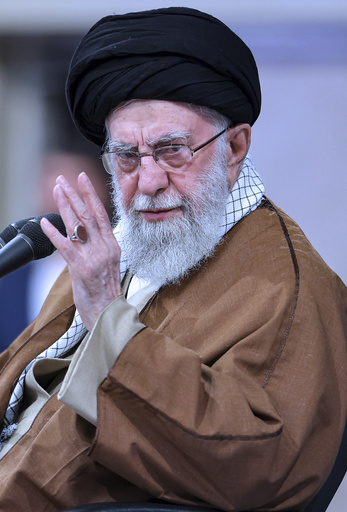DUBAI, United Arab Emirates — On Friday, Iran’s supreme leader made it clear that discussions with the United States are not considered “intelligent, wise, or honorable.” This assertion came in response to President Donald Trump’s recent suggestion to engage in nuclear discussions with Tehran. Ayatollah Ali Khamenei stated that “no negotiations should occur with such a government,” though he refrained from outright forbidding dialogue with Washington.
Khamenei’s comments seem to overturn months of indications from Tehran showing a willingness to negotiate over its rapidly progressing nuclear program in exchange for the lifting of stringent economic sanctions amounting to billions. As a result of the supreme leader’s statements, the Iranian rial experienced a dramatic decline, plummeting to an unprecedented 872,000 rials per dollar in post-market trading.
The future direction of these interactions remains ambiguous, especially considering that reformist President Masoud Pezeshkian had vowed just a day earlier to engage in talks with Western nations. Khamenei’s statements to air force personnel in Tehran appeared to contradict earlier messages he conveyed in August that seemed to welcome discussions. Nevertheless, the 85-year-old supreme leader has been cautious in framing his stance on negotiations with Western countries, often balancing the expectations of reformists within Iran against conservative factions, including the influential paramilitary Revolutionary Guard.
During his remarks, Khamenei harkened back to Trump’s unilateral withdrawal from the previous nuclear agreement, which had imposed significant restrictions on Iran’s uranium enrichment in return for the lifting of sanctions. “The Americans did not uphold their end of the deal,” Khamenei stated emphatically. “The very person who is in office today tore up the agreement. He said he would, and he did,” he added.
He emphasized that Iran’s experience in negotiations should inform future actions: “We negotiated, we made concessions, we compromised—but we did not achieve the results we aimed for. And despite all its flaws, the other side ultimately came to violate and dismantle the agreement.”
Khamenei’s comments have arisen in a backdrop of mixed signals from both Iran and Trump. They followed Trump’s indication that he was eager to strike a deal with Tehran, coinciding with his decision to reintroduce the “maximum pressure” strategy on Iran through an executive order. “I’m going to sign it, but hopefully we’re not going to have to use it very much,” Trump remarked from the Oval Office. “We will see whether or not we can arrange or work out a deal with Iran,” he continued.
Expressing his stance, Trump stated, “We don’t want to be tough on Iran. We don’t want to be tough on anybody.” However, he underscored a firm red line: “But they just can’t have a nuclear bomb.” Following this, Trump took to social media, asserting that reports of the U.S., alongside Israel, intending to obliterate Iran were “greatly exaggerated.” He expressed his preference for a “Verified Nuclear Peace Agreement,” advocating immediate negotiations to foster peace and prosperity for Iran.
Khamenei and other Iranian leaders utilize vague, indirect language to guide their policies, avoiding definitive commitments while engaging with various factions vying for influence within Iran’s complex power structure. Just a day before Khamenei’s comments, Pezeshkian expressed optimism about allowing additional inspections by the International Atomic Energy Agency (IAEA), reflecting a potential willingness for greater transparency.
While Iranian officials have reiterated their stance that the country’s nuclear ambitions are for peaceful purposes, they are currently enriching uranium to 60% purity—only a short technical step from the 90% purity required for weapons-grade material. Some officials have even hinted at a potential pursuit of an atomic weapon. U.S. intelligence agencies have concluded that while Iran has not yet initiated a formal weapons program, it has taken steps that could position it to develop a nuclear device if it ultimately decides to do so.
Earlier in the week, Trump made controversial remarks regarding the displacement of Palestinians in Gaza, suggesting resettlement outside the area due to ongoing conflict and pitching the idea of transforming Gaza into “the Riviera of the Middle East.” Khamenei appeared to respond to these remarks, commenting on America’s alleged attempts to reshape geopolitical realities without any basis in fact, expressing a commitment to respond to threats against Iran proportionally and resolutely.
In a separate development, Iran’s Foreign Ministry condemned the U.S. Treasury’s recent sanctions against companies involved in trading Iranian crude oil to China. The Treasury had accused these firms of creating a network facilitating the shipment of significant quantities of Iranian crude. Esmail Baghaei, the Foreign Ministry spokesman, characterized the sanctions as “completely unjustified and contrary to international rules and regulations.”
This website uses cookies so that we can provide you with the best user experience possible. Cookie information is stored in your browser and performs functions such as recognising you when you return to our website and helping our team to understand which sections of the website you find most interesting and useful.
